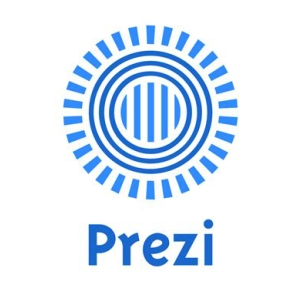
Prezi – Detailed Explanation
Prezi is an online presentation software tool that offers dynamic and visually engaging ways to present information. Unlike traditional slide-based presentations (like PowerPoint), Prezi uses a single canvas where the presentation zooms in and out, providing a more interactive and creative way of showing content.
1- On which platform are the tools used?
Prezi is primarily a web-based tool, but it also offers desktop and mobile applications:
- Web: Prezi can be accessed directly via a browser on their official website.
- Desktop: Prezi also offers Prezi Desktop, available for Windows and Mac users.
- Mobile: The mobile app is available for both iOS and Android, allowing users to view and present Prezi presentations on-the-go.
2- What hardware requirements are needed?
Since Prezi is an online platform, it runs on most devices, but here are the recommended hardware specifications:
- Operating System:
- Windows: Windows 7 or later.
- Mac: macOS 10.10 or later.
- Mobile: iOS 12.0 or later for iPhones/iPads, Android 5.0 or later for Android devices.
- Processor:
A modern processor such as Intel Core i3 or better is recommended. - RAM:
4 GB or more is suggested for optimal performance. - Internet:
A stable internet connection is necessary for the web version, especially to load and share presentations.
3- Installation and membership stages
Installation Process:
- Web Version:
No installation is required for using Prezi on a web browser. Simply visit Prezi.com and sign up for an account. - Desktop App:
- Go to the Prezi website or your respective app store (Mac App Store or Microsoft Store) to download and install the Prezi desktop application.
- Once downloaded, sign in with your Prezi account or create one.
- Mobile App:
- Go to the App Store (iOS) or Google Play (Android).
- Search for Prezi and install the app.
- Sign in with your account to access your presentations.
Membership Stages:
Prezi offers different membership plans:
- Free Plan:
- Provides access to basic features but with limited templates and some restrictions on presentation privacy (public sharing).
- Prezi Standard/Plus/Pro Plans:
- Paid plans offer advanced features such as private presentations, HD video exports, custom branding, and offline access.
- Prezi Teams:
- This plan is for organizations and allows collaboration, real-time editing, and team management features.
4- What can it be used for?
Prezi can be used for a variety of purposes:
- Presentations:
Prezi is primarily used to create presentations, offering a more interactive and engaging alternative to traditional slide-based presentations. - Educational Content:
It’s widely used by educators to create interactive lessons, projects, and visual aids to help explain complex topics in a dynamic and visual manner. - Business:
Professionals use Prezi to create impactful business presentations, sales pitches, and marketing proposals. - Pitch Decks and Proposals:
Many startups and entrepreneurs use Prezi to present their business ideas or proposals to investors, making their presentations stand out with dynamic visuals.
5- What is its prominent feature compared to other tools?
Prezi’s prominent features compared to other presentation tools are:
- Zooming User Interface (ZUI):
Prezi is famous for its zooming canvas, where users can zoom in and out to focus on different parts of the presentation, creating a non-linear and more dynamic storytelling approach. This is a key differentiator compared to linear slide-based presentations in tools like PowerPoint. - Interactive and Non-linear Structure:
Unlike traditional presentations that follow a strict, linear order, Prezi allows for an interactive structure, where users can navigate between various parts of the presentation dynamically. - Collaborative Features:
Prezi offers real-time collaboration features, allowing multiple users to work on the same presentation simultaneously, which is useful for teams. - Visually Stunning Templates:
Prezi has a wide range of visually engaging templates that enable users to create more creative and impactful presentations.
6- Sample application made with pictures
Example: Educational Prezi Presentation
Step 1:
Create a presentation about the Solar System, using a Zooming Canvas.
Step 2:
Add sections for each planet, with zoom-in animations that take the audience closer to the information.
Step 3:
Add images, text, and other media to each section to explain the characteristics of each planet.
Picture:
7- Which courses can it be used in and is compatible with?
Prezi is compatible with and can be used for a variety of courses:
- STEM Courses:
Prezi can be used in science, technology, engineering, and mathematics courses to explain complex concepts in an interactive and visual manner. - Business and Marketing:
Prezi is popular in business courses for creating impactful presentations, pitch decks, and product proposals. - Humanities:
Humanities courses, including history and literature, can benefit from the visual storytelling features of Prezi. - Art and Design:
Visual arts and design courses can use Prezi to showcase portfolios and creative projects in a more engaging format. - Education:
Prezi is widely used by educators to create lessons and teaching materials for engaging classroom presentations.
8- Is it free?
Prezi offers a free plan, but it comes with limitations:
- Public Presentations:
The free plan allows only public presentations, meaning anyone with the link can view your content. - Limited Features:
The free version has access to basic features, but advanced features like offline access, HD export, and privacy settings are available only in paid plans.
9- Links related to Prezi
- Official Website: Prezi.com
- Pricing Page: Prezi Pricing
- Prezi Blog: Prezi Blog
- Prezi Help Center: Prezi Support
- Prezi Tutorials: Prezi Academy
Prezi is a powerful and dynamic tool for creating interactive and visually appealing presentations. Its zooming interface and non-linear structure offer a refreshing alternative to traditional slide-based tools, making it popular in education, business, and creative industries.